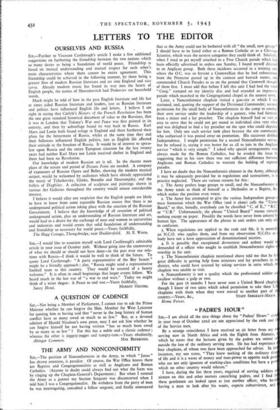• LETTERS TO THE EDITOR
OURSELVES AND RUSSIA
SIR,—Further to Viscount Castlereagh's article I make a few additional suggestions on furthering the friendship between the two nations which so many desire as being a foundation of world peace. Friendship is based on mutual understanding and mutual respect for each other's main characteristics where there cannot be entire agreement. This friendship could be achieved in the following manner, by there being a greater flow of modern Russian literature and art into England and vice versa. Already modern music has found its way into the hearts of English people, the names of Shostakovitch and Prokoviev are household words.
Much might be told of how in the past English literature and life has at times aided Russian literature and leaders, just as Russian literature and politics have influenced English life and letters. I believe I am right in saying that Carlyle's History of the French Revolution has been the one great standard historical document of value to the Russians, that it was in London that Tolstoy's War and Peace was first printed in its entirety, and then by subterfuge found its way back to Russia. Karl Marx and Lenin both found refuge in England and there furthered their plans for the betterment of Russia, whilst at the same time they and their followers influenced English politics, just as English life affected their attitude to the freedom of Russia. It would be of interest to specu- late upon Russia and the entire European situation for the last twenty years had neither Karl Marx nor Lenin received shelter in England and there had been no Revolution.
Our knowledge of modern Russian art is nil. In the theatre more plays of the nature and period of Distant Point are needed. A company of exponents of Russian Opera and Ballet, showing the modern musical output, would be welcomed by audiences which have already appreciated the music of Tchaikovsky, Glinka, Borodin and Moussorgsky, and the ballets of Diaghilev. A collection of sculpture and paintings shown in various Art Galleries throughout the country would arouse considerable interest.
I believe it would allay any suspicion that the English people are likely to have to know from some reputable Russian source that there is no underground political action taking place with the sanction of the Russian Government. I believe that the knowledge of all cessation of political underground action, plus an understanding of Russian literature and art, would lead to a desire for the exchange of men and women to universities and industries and would create that solid foundation of understanding and friendship so necessary for world peace.—Yours faithfully, The Hagg Cottage, Thongsbridge, near Huddersfield. M. E. WOOD.


























 Previous page
Previous page